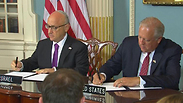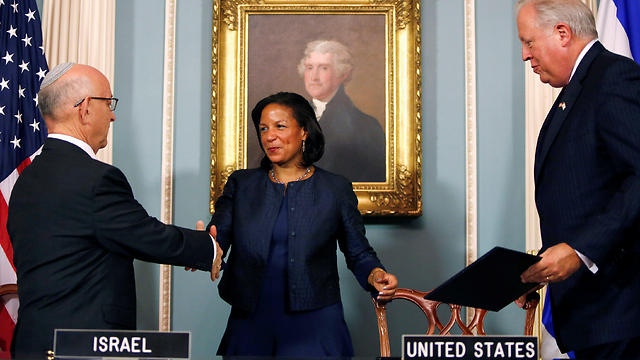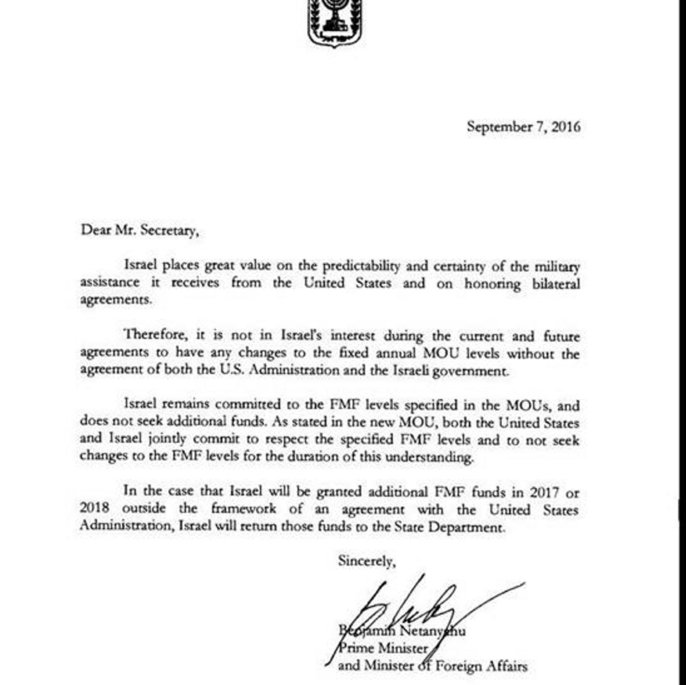
Israel and US sign military aid package deal
US aid package: A strategic missed opportunity
Op-ed: A responsible policy would have accepted Obama's invitation to enter a thorough strategic discourse on the Iran deal in which Israel would have pointed at its problems while preparing to deal with its risks; instead, Netanyahu chose to break off contact with the administration and intervene in American politics.
The military aid agreement signed by Israel and the United States last week is not a historic achievement but a strategic missed opportunity.

The agreement preserves the extent of America's support for Israel in a similar – or slightly lower – manner than the American support in the past decade. Considering the long-term challenges and the strategic reality created by the nuclear agreement with Iran, Israel could have obtained a much larger aid package.

Both Obama and Netanyahu tried to present a significant increase in military aid, but the mathematical truth is that there is no such increase (Photo: Reuters) (צילום: רויטרס)
The significance the number $3.8 billion represents is not as important as the actual failure to obtain long-term strategic agreements between Israel and the US, or the failure to reach a "parallel agreement" which would allow Israel to deal with the long-term ramifications of the Iran deal. Both US President Barack Obama and Prime Minister Benjamin Netanyahu tried to present (the deal as) a significant increase in aid, but the truth is that there is no such increase.
Last summer, Israel faced a very problematic nuclear agreement signed with Iran. While it was not a "new Holocaust," as believed in Jerusalem, it was not a "positive historic agreement," as believed in Washington either. A thorough examination of the agreement indicates that it reduces the Iranian nuclear threat in the short run, but conceals many dangers to Israel in the long run.
In the agreement, Iran received legitimacy for unlimited nuclear abilities, which would allow it to get very close to a bomb. The agreement is very problematic in the conventional arena as well, as Iran receives additional resources and legitimacy to build its power and grow stronger. And if that were not enough, the compensation received by Arab states in the form of advanced weapons worth hundreds of billions of dollars has a potential component of threatening Israel's qualitative advantage.
A responsible and far-reaching policy would have adopted the recommendation of the Institute for National Security Studies in the summer of 2015 and accepted the American president's invitation to enter a thorough strategic discourse. As part of such a discourse, Israel would have pointed at the agreement's problems while preparing to deal with its risks. Such a discourse would have yielded not only a more generous aid agreement, but also strategic understandings on the ongoing reinforcement of the intelligence activity, on preparing diplomatic and military options in case the agreement fails, on supplying unique systems to Israel, amongst other issues.
But Jerusalem chose a different policy, a policy of breaking off contact with the administration and intervening in American politics through a Congressional address, which eventually did not change anything in the agreement with Iran and was simply a failed alternative to a dialogue and agreements which could have greatly bolstered Israel's security.
The final chord of the aid agreement is represented by a somewhat absurd and humiliating letter, which Netanyahu was asked to sign. In the letter, he pledges to return additional funds allotted to Israel beyond the agreement. The letter represents the state of relations with the US which Netanyahu has led Israel too, and it appears that the Obama Administration could not help itself and had to mock the three bodies which declared a political war on the administration in the summer of 2015 – the prime minister (who promises to return funds), Congress (whose funds will be returned if allotted) and the AIPAC lobby (which remains jobless).
Maj. Gen. (res.) Amos Yadlin is the executive director of Tel Aviv University's Institute for National Security Studies (INSS).











